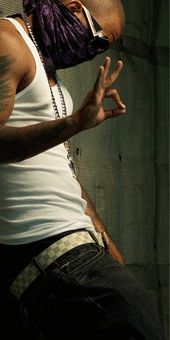The Black Wallstreet
The name "The Black Wall Street" is adopted from the historical Black community of Tulsa Oklahoma. The date was June 1, 1921, when "Black Wall street," the name fittingly given to one of the most affluent all-black communities in America, was bombed from the air and burned to the ground. In a period spanning fewer than 12 hours, a once thriving 36-black business district in northern Tulsa lay smoldering. A model community destroyed, and a major Black economic movement resoundingly defused.The Game decided to help his own label gain success in hopes of being similar to his former label. Big Fase 100 co-founder, officially left the label after internal problems began between him and The Game. Currently the only project the Black Wall Street has released as a group is a mixtape called The Black Wall Street Journal Vol. 1 . The label is thought to have a distribution deal with Capitol Records. Former artists who have been on Black Wall Street include: Eastwood, Glasses Malone, Techniec, Young Life, Cyssero, Vita and Charli Baltimore.
Jive Records
Jive Records was formed by Clive Calder in 1975 and was launched in the United States as a branch of the Zomba Recording Corporation in 1981. The word "jive" was inspired by Township Jive, a form of South African music and dance. Upon initial launch, early US distribution was by Arista Records until 1987. Following the creation of BMG the same year, distribution of Jive switched to RCA Records. Early signings to Jive included Whodini, A Flock of Seagulls, Billy Ocean, and Samantha Fox.Free from the authority of Arista head Clive Davis (who at the time was known to be opposed to hip-hop music), as the 1980s drew to a close, Jive went on to sign a plethora of hip-hop acts, including controversial rappers, Too $hort and Schoolly D. By the early-mid 1990s, Jive had become a premiere label in the world of hip-hop, thanks to the success of acts like Whodini, DJ Jazzy Jeff & The Fresh Prince, E-40, A Tribe Called Quest, KRS-One and R&B acts such as Aaliyah and R. Kelly. Jive tried to ride the coat tails of the spectrum of urban-oriented music in the United States by venturing into house music with several compilations and by signing artists such as Liz Torres and Mr. Lee during the late 1980s and early 1990s.Jive's distribution deal with RCA expired in 1991, at which time BMG purchased a large minority stake in the label and switched to BMG Distribution proper. That same year, Barry Weiss became CEO and president of Jive Records — a position he holds to this day.By the mid-late 1990s, despite its reputation for dealing heavily in hip-hop, Jive signed fledgling pop acts Backstreet Boys, *NSYNC, and Britney Spears—all of whom achieved massive success as the 2000s dawned, and would become the three best-selling acts in the label's history.Backstreet Boys sold over 100 million albums worldwide. Britney Spears has sold over 83 million albums, and NSYNC 50 million.From 1991 through 2002, Jive operated as an independently-managed label, with distribution of its records handled by BMG directly. Zomba also had several other labels under its aegis under the same deal.In 2002, Bertelsmann Music Group acquired the remainder of Zomba for US$2 billion, which was at the time the largest-ever acquisition of an independent label with major-label distribution. The company was reconfigured and renamed Zomba Label Group, under which Jive continues to operate. In 2004, Sony Music and BMG created a 50/50 joint venture, Sony BMG Music Entertainment, of which the Zomba Label Group is one of its divisions.
..
